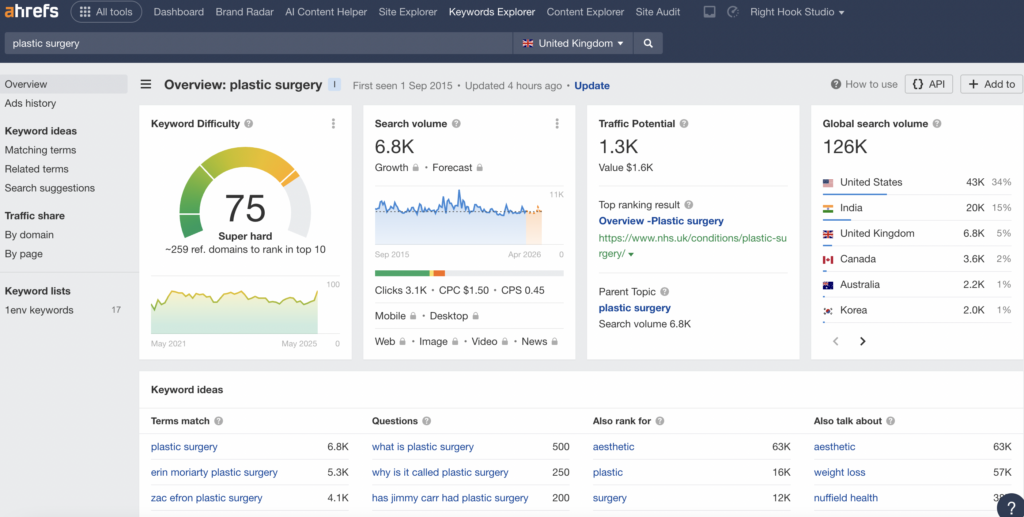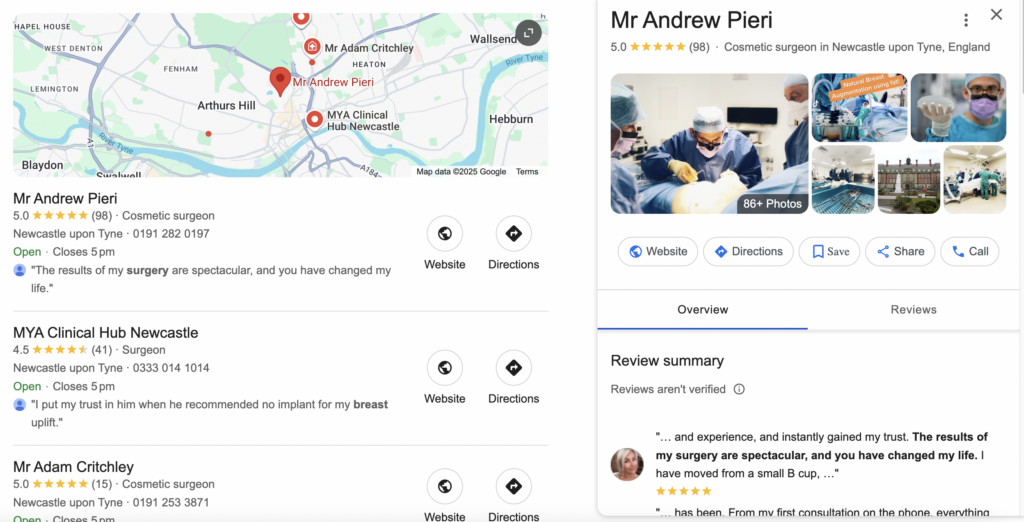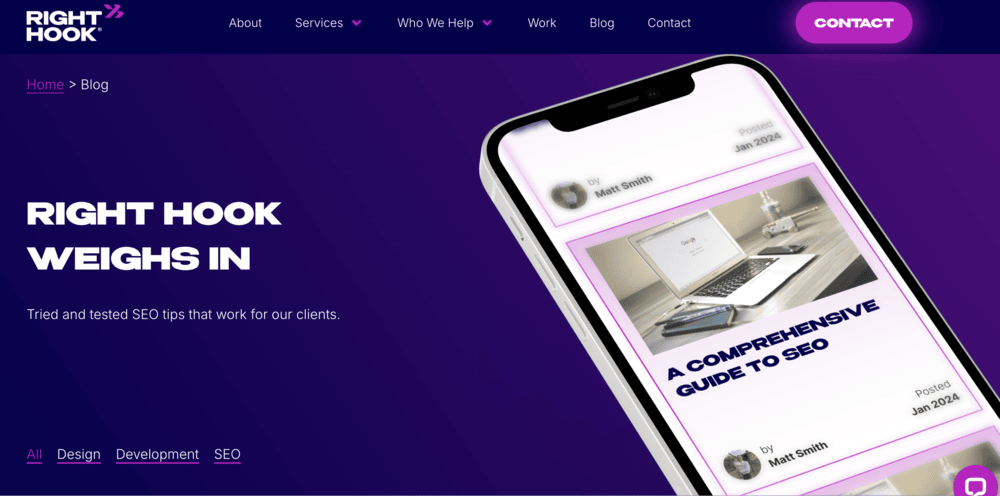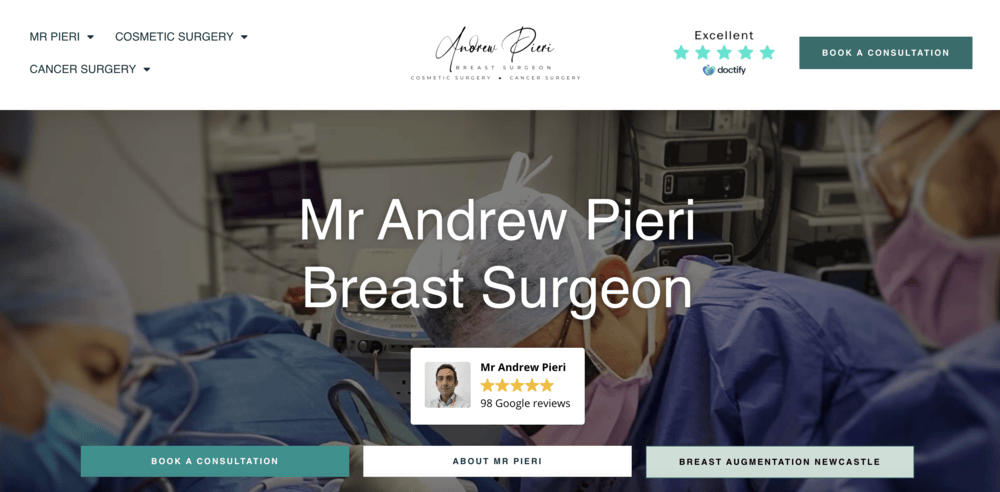Plastic Surgery SEO
Published:
With today’s social media-obsessed world and the focus on aesthetics getting increasingly pronounced, it’s no wonder that the UK’s cosmetic surgery market is booming.
While there is high demand, there’s also strong competition, so plastic surgery practices need to focus on creating a comprehensive SEO strategy that promotes growth and helps them reach prospective patients.
As a leading digital marketing agency that works with numerous plastic surgery practices as clients, Right Hook understands the importance of SEO for plastic surgeons. Keep reading to find out more.
Get Started
To begin, you need to work out a plan of action and figure out how much you want to spend on your plastic surgery SEO strategy and how much time you’re willing to invest in it.
It also pays to do your research and find the SEO tools and techniques you want to use to make building your plastic surgeon SEO strategy easier for you, as well as to see what other cosmetic surgeons are doing.
Check out other plastic surgeons in your area and see what work they’re doing and what web pages they have so you can align your SEO efforts with theirs and improve your chances of getting on relevant search engine results pages.

Carry Out Keyword Research
Choosing and using the right keywords is crucial for SEO as it helps search engines understand what your content is and how to rank it.
As well as helping you rank higher on relevant search engine results pages, targeting the right keywords also helps your business provide the information your readers need and reach your target audience.
By using keyword research tools, such as SEMrush or Ahrefs, you can identify terms that have a high search volume and are, therefore, important to your audience.

Build Your Website
Every business needs a website, and a plastic surgery practice is no exception. You’ll need a plastic surgery website that has the functionality that your patients expect, such as booking platforms and clear guidance on the types of plastic surgery procedures you offer.
Some of these functions can be created and managed using website builder tools, but for larger plastic surgery clinics, you might want to consider a custom-built website.
Working with a team of website developers who are experienced in creating and managing plastic surgery websites can ensure that you get all of the functionality you need and improve your chances of ranking highly on relevant search engine results pages, since technical SEO is a key part of search engine optimisation.
Work On Local SEO Using Your Google Business Profile
While many patients will travel to the right plastic surgery practice, local SEO is still a key part of your plastic surgery SEO strategy.
That means creating a Google Business Profile (formerly known as a Google My Business Profile) for your plastic surgery clinic’s location.
Since the Map Pack is often above most organic search results, having a high-ranking GBP can help improve your online visibility when it comes to local SEO.
Optimising your GBP means adding the right plastic surgery services, sharing your opening hours, adding photos and videos, linking it to your social media profiles and writing an accurate description of your plastic surgery practice.
Additionally, you can create regular GBP updates to share with your potential patients to improve engagement with your profile.

Create Informational Content
While service pages detailing the types of plastic surgery you offer are vital, it’s important that you know your audience.
For plastic surgeons, sharing informational content, such as guides, is vital. It can help you showcase your expertise and compete with other clinics.
Using your keyword research, you can find long-tail keywords and questions that are highly searched and will be best suited to blog posts.
Then, you can create high-quality content using your expertise to help you reach more potential patients.
Keep Adapting And Learning
Much like the healthcare industry, SEO is constantly evolving and changing. Search engines regularly update their systems, and new competitors enter the market, so you need to be flexible and adapt.
That means reading Right Hook’s blog and following us and other SEO experts on social media to ensure that you’re always aware of the latest industry developments and new digital marketing tactics.
By working hard to learn and stay ahead of the fast-moving SEO landscape, you can ensure that your plastic surgery SEO strategy is always in line with industry best practices.

What Is Plastic Surgery SEO?
SEO stands for search engine optimisation and is the process of getting a business noticed online for its target keywords.
It covers a wide range of strategies and platforms, including managing your online reputation, getting your business noticed on local SEO platforms, such as Google Maps, and building a website that reaches your target audience and helps drive them to work with you.
Specifically, when applied to the plastic surgery market, this practice involves helping guide prospective patients to use your plastic surgery services.
It involves a combination of local SEO strategies with building the right plastic surgery website and adding relevant content that will get your business noticed and respected.
Because plastic surgery is a set of cosmetic procedures that can affect a patient’s health, it is classed as one of Google’s Your Money Or Your Life (YMYL) topics. As such, all website content has to be well-researched and must cite relevant sources for it to show up on relevant search engine results pages. That’s why SEO for plastic surgeons is considered a harder practice than SEO for other businesses.
Why Does Your Plastic Surgery Practice Need SEO?
Plastic surgery SEO is crucial for any practice because it is the only way to grow your business and reach new prospective patients.
Anyone considering cosmetic surgery will always check online for reviews before committing to a procedure. So, even if someone, somehow, manages to find out about your clinic through traditional advertising, if they can’t find any mention of your practice online, they are unlikely to make a booking.
Prospective plastic surgery patients want to see a practice that is active online, and that means working to showcase your business and the knowledge of the doctors who work there.
To grow your business and welcome more patients to your plastic surgery practice, you need to carry out cosmetic surgery SEO.

Get Expert Plastic Surgery SEO
Managing your plastic surgery practice and carrying out all of this digital marketing work can be incredibly challenging. To ensure you provide your patients with the best possible service and grow your business, you could consider working with a digital marketing agency that can carry out the work for you.
Right Hook has worked with a range of cosmetic surgeons, including leading breast surgeon Andrew Pieri. Our work has helped him grow his practice and become one of the leading breast surgeons in Newcastle.
With our plastic surgery SEO services, you can save time and focus on your plastic surgery practice, knowing that your SEO and digital marketing strategies are in safe hands.
If you’re ready to grow your plastic surgery practice with expert help, book a call with our Director, Matt. He can build you a bespoke plastic surgery SEO strategy that’s tailored to your specific focus and will enable you to enhance your practice.
Article by:
Matthew Smith
Helping local service companies grow is my speciality! I thrive on getting results through my specifically tailored 3-part framework. I absolutely adore working with my favourite clients who provide services in specific local areas and work in niches such as pest control, dentistry, plumbing, dog training, and cosmetic surgery. All these companies needed was a little guidance to unlock the full potential of search marketing and to maximise their success.
